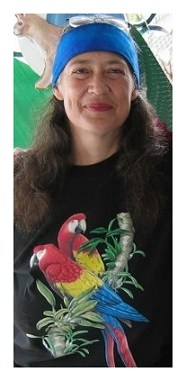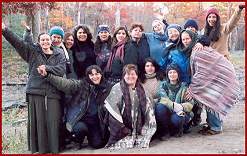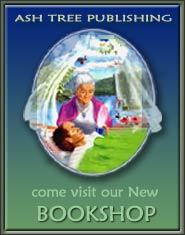SUSUN WEED
herbalist, author, teacher, wise woman
Interview-Weed3
The Path of the Wise WomenAn Interview with Susun Weed
by Corinna Wood
Q: Susun, you have become known as today's voice for the Wise Women Tradition of Herbal Medicine. Can you explain what that means?
A: Yes, most people have come to think of health care as a choice between orthodox medicine, which is sometimes called allopathic medicine, or alternative medicine. In my studies, it became more and more clear to me that although there are major differences between orthodox medicine and alternative medicine, that there was still a lot lacking in what I was being told was alternative medicine. I went back, I had a guide, who learned 20,000 cures in the past, I went back to meet her, learn from her, and study with her that healing. She taught me the elements of a third way of healing that I call The Wise Women Method. In Orthodox medicine, we have a linear approach; in the Heroic tradition, we have a circular approach,; in the Wise Women tradition, we have a spiralic approach and we seek to nourish the health of the whole individual.
Q: I understand you made a twenty-year commitment in studying the Wise Women Tradition. Is that over and what does that mean for you and the Wise Women Tradition?
A: I realized as I began to articulate the Wise Women Way, that it would be necessary for someone to really bring this information and third way ecumene to people and to explain how it is different. Not only our individual health but the health of the whole planet might be different if we focus on nourishing instead of fixing or cleansing. I willingly offered up twenty years of my life to being that person who would make the Wise Woman Tradition an option. I don't think that anything anyone chooses in healthcare is wrong, although some things we choose in healthcare can be very dangerous to our health, but it is up to the individual person to decide. My goal was to make the Wise Women Tradition known, not exactly as a household word, but to at least have the idea of it in people's minds. I feel that in these past years, I have. Certainly paths like Wise Women have become very popular and it has flown away from me, which is exactly what every parent wants, for our children to grown up strong, independent and healthy. If I were to die today, the Wise Women Tradition would continue. I feel rich and rewarded by my efforts. I feel I have accomplished what I have set out to do. After doing it for twenty years, it is inconceivable for me to do something else. It is time for me to draw back and reassess. As I come in to 2005, I will be taking a year off to assess what I have done, what I would like to do in the future and to come to clarity on my future commitment.
Q: Your role has been such a service to both women and men. I know your words and your work particularly resonates so deeply for so many women.
A: Thank you. It does resonate because it is the very, very best of our ancient past. In the modern world, more and more of us are living in cities, more and more of us need to remember that the earth is our mother.
Q: How do you see the roles of food and herbs weaving together in health and healing?
A: One of the things I propose is that we think of herbs in four categories. Nourishing herbs are like nettles and garlic, like the turmeric we will have in our curry. Nourishing herbs are food and food-like herbs we can use on a day-to-day basis in our lives.
Tonifying herbs are a little more vigorous in their actions on the body. These are herbs like burdock root, dandelion root, and motherwort. Tonifying herbs are like exercise, they build strong functioning, but they need to be taken with wisdom and understanding. We generally don't want to do tonifying herbs everyday. I am not saying you can't do it on a daily basis, but it is for a short term, when we are working with the tonic. Now there might be a situation where they would take it on a daily basis if they were using it to help with a problem, like someone who is bringing their blood pressure down. Motherwort is a heart tonic and is used on a daily basis.
The third category would be stimulating/sedating herbs like cayenne, ginger, cinnamon, skullcap, and chamomile. These are herbs that the Heroic tradition cooked with quite a lot. It is through these herbs that many people come to herbal medicine. And certainly these herbs are highly effective. But as with any stimulant or sedative they gradually erode the good healthy functioning of our body. So in general we want to use stimulants and sedatives as infrequently as possible. When we do use them we want to use them in the smallest amounts possible. Many people will wonder "What about my morning cup of coffee?" Well, trade your morning cup of coffee for a cup of infusion of an herb like nettles or oat straw. One cup of coffee a day can cause withdrawal effects, but once they get past that withdrawal, they generally find that their energy is better, they feel more alert, and most important, their blood sugar does not escalate after drinking their morning brew.
The fourth category is potentially poisonous herbs, like goldenseal or pokeroot. People are always alarmed when I say goldenseal is a potentially dangerous herb because people are used to thinking that it is the herb par excellance. In my work of forty years with herbs, I have only used goldenseal once and I used it externally. I have never used it internally. I am dismayed by the amount of it that is put in echinacea tincture. I tell people, read the label very carefully, It might not say it on the front, but if you turn the bottle over and look on the back, usually in small letters it says "with goldenseal". You are putting together two things that don't work well together, that don't like each other, that ultimately interfere with each other. I am very clear with people that goldenseal is potentially poisonous and that they need to stop using it.
Q: Can you say more about the poisonous action of goldenseal? Does it put stress on the liver? Can you say more about poke?
A: Yes, it puts stress on the liver, and the whole body. Goldenseal is a very powerful and dangerous antioxidant.
Poke is a very common and interesting plant. Pokeroot is the part that I am talking about, it is potentially poisonous. The entire plant contains substances that make us throw up, give us diarrhea and can really tear up the intestines. The root is very concentrated so the effects wreak havoc on the body. The leaves, essentially from where the stalk turns red on up, can be cooked so long as it is done with several rinses of water. You take water with the leaves, bring to a boil, throw away the water and repeat several times. We all know people who just cook poke leaves in water and then eat them. It is not generally considered safe. In terms of poke poisoning, poke berries are a common concern among parents. The berries are so beautiful and appealing to children. It is not the berry but the seed that is poisonous. In general our teeth are not strong enough to break the seeds. Just like apple seeds. they are very poisonous, but that doesn't keep us from eating apples does it? We can't be poisoned by the pokeberry because we can't break down the poke seed. We eat the pokeberry, we eat the poke leaves, but we don't eat the pokeroot.
Susun Weed, green witch and wise woman, is an extraordinary teacher with a joyous spirit, a powerful presence, and an encyclopedic knowledge of herbs and health. Ms. Weed's four herbal medicine books focus on women's health topics including: menopause, childbearing, and breast health.
Corinna Wood is the owner of Red Moon Herbs, making herbal medicines business in Black Mountain from fresh, local plants for over 10 years. She did an extensive apprenticeship with Susun Weed in 1993, and continues to carry on the wise woman tradition through local classes as well as making herbal medicines.
by Susun S. Weed
Introduction by Jean Houston.
Superb herbal in the feminine-intuitive mode. Complete instructions for using common plants for food, beauty, medicine, and longevity. Seven herbs -- burdock, chickweed, dandelion, nettle, oatstraw, seaweed, and violet -- are explored in depth.
A Special Tenth Anniversary edition of this classic herbal, profusely illustrated. 312 pages.
Retails for $21.95
Read a Review
Order HEALING WISE in our BookshopI just started reading your book, Healing Wise. Your humor and approach to life seem so "down-to-earth", just like your favorite powerful weeds. Thank you for sharing and nourishing! ~ Diane
Moon Rites - a feminine path to personal power
Moon Rites is designed to be used as a tool to enhance your self-knowledge, acceptance, and personal power. It is divided into three sections. The following is a rundown on what's in it and how you can use it.
With Moon Rites you will:
Rediscover connections between your body & soul
Unleash your inner power, intuitive ability, creative drive
Reclaim the wisdom and magic of the lunar cycle
Renew your female body, mind and spirit
Empower yourself to make positive life choices.Order Moon Rites in our Bookshop
Read an article by Michelle Royce ~
Moonwatching - reclaiming your feminine power
[ Home Page | Contact Us | Press
Kit | Site
Map]



